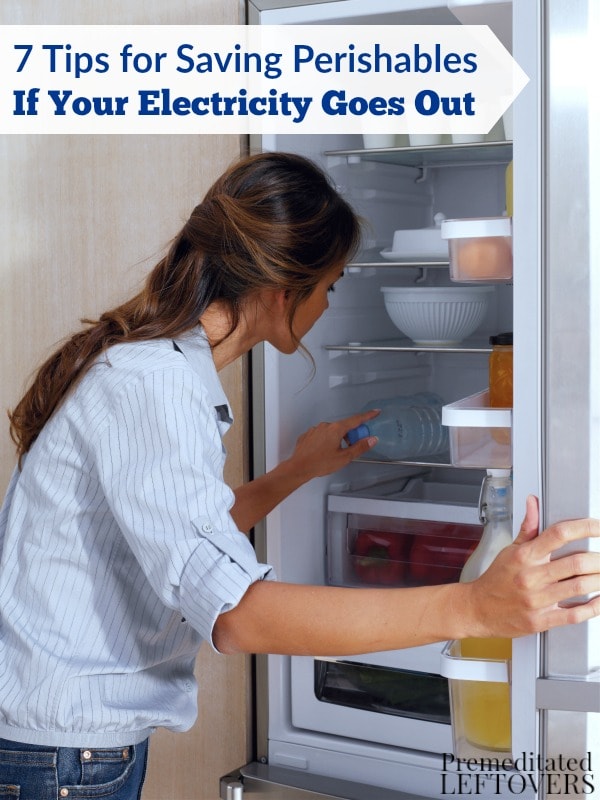It’s important to keep food safe and avoid spoilage when you lose power. These 7 Tips for Saving Perishables If Your Electricity Goes Out will show you how.
Winter storms and other severe weather conditions can bring your electricity to a screeching halt. When this happens, your first concern is most likely your food supply and how to keep it from spoiling. Since you don’t know how long your power will be out, it is good to have a plan in place for when this occurs. Take a look below at 7 Tips for Saving Perishables If Your Electricity Goes Out. These tips can help you keep food safe and avoid spoilage!
7 Tips for Saving Perishables If Your Electricity Goes Out
1. Use the coin test. Freeze a cup of water and place a quarter on top of it. Place the cup in your freezer. The purpose of this is to know if the electricity went out while you were gone. You will want to know of course how long it went out and how safe your food is to eat. If you return home and the ice/coin is in the original state, the electricity went out for a brief period and is now fine. If the coin is frozen in the center of the cup, it means electricity went out long enough to melt the ice half way before refreezing. Your food should be checked prior to consumption. If the coin is at the very bottom of the cup, chances are the electricity was out for some time and all food should be discarded.
2. Keep coolers on hand. If an outage happens fill coolers with ice you have on hand (always keep a few pounds of ice ready in your freezer) and place perishables inside. Of course space will be limited so put your most important items like protein sources and vitamin sources inside first. Keep the coolers closed as much as possible and only open if necessary.
3. Don’t open your refrigerator or freezer. While you are making preparations after an outage, DON’T open your fridge or freezer unless necessary. Each time you open it you let cold air out and let warm air in. This can cause defrosting to happen much quicker than it would if you left the door closed.
4. Invest in a generator. If power outages happen in your area often, you may wish to invest in a generator. While it won’t power your entire house, it will at least keep basics such as your refrigerator running. This can help prevent spoilage quite nicely. A generator is a costly investment, but worth it if you live in an area where such outages occur often.
5. Use a sink as a back up cooler. If you don’t have a cooler on hand, place the stopper in your sink and fill it with ice. Place perishables inside the sink and cover it with a piece of tinfoil. This can help keep items cold until you come up with a cooler or the power returns. If using this option, don’t lift the foil unless you have to.
6. Move items to the garage if it is an option. If the outage takes place during the winter, you can always move perishables to the garage where they will stay cold. Of course it depends how cold the garage is, as temperatures may have dropped to freezing. Some items like soda cans and jars of food can explode in this type of environment, but other food items should be fine. Keep food items in crates with lids so critters stay out of them.
7. Move valuable items to a friend or neighbors. Items such as meat, seafood, or special dietary items can be moved to a friend’s house if that is an option. If all other methods fail, see if you can get the bulk of your meats to another location where it can be kept safe until you can get to it.
When the power goes out, don’t panic. Instead, remember these tips for preserving food in a power outage and see how much you can really save!
More Ways to Reduce Food Waste:
How to Reduce Food Waste and Save Money on Groceries
7 Ways To Reduce Food Waste At Home
Fridge Tricks to Reduce Food Waste and Save Electricity


Shani mantra says
A few years ago our power went out for a week. This would have been really helpful!